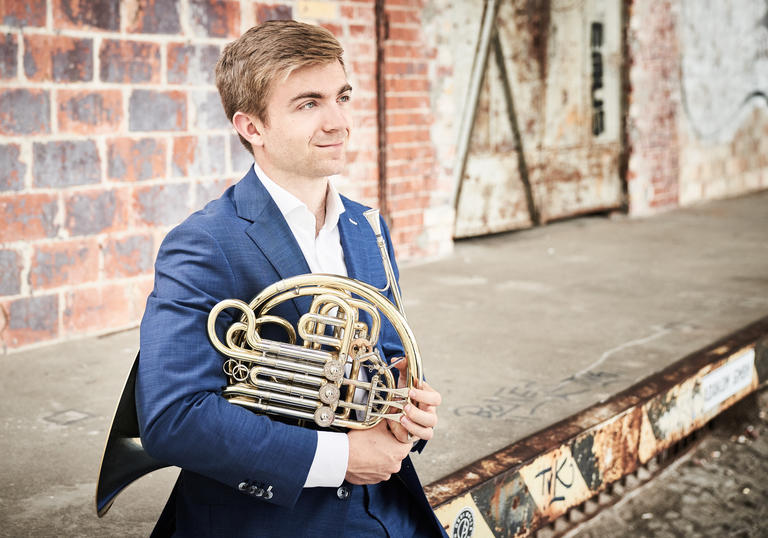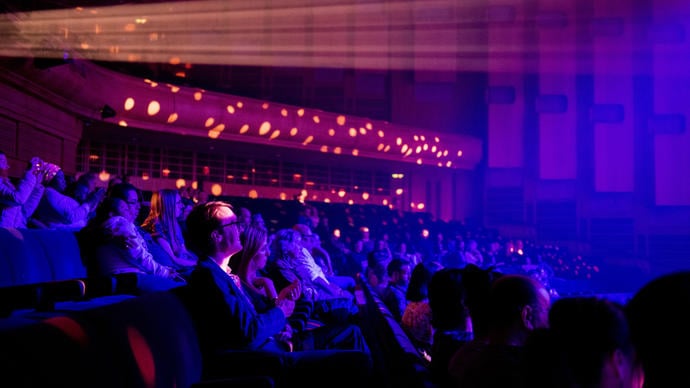Digital Programmes
Ben Goldscheider and Tom Poster
Start time: 1pm
Approximate running time: 75 mins, with no interval
Please note all timings are approximate and subject to change.
This performance is subject to government guidelines

Harriet Smith sits down with Ben Goldscheider, a man on a mission.
When he won the brass category of BBC Young Musician in 2016 and was selected as one of three musicians for the concerto finale, he talked of his desire to increase the popularity of the French horn. Now, five years on, his aim is both to celebrate the instrument’s existing repertoire and to expand it with new works, following in a great tradition of composers being inspired by charismatic exponents of the instrument.
Today he and pianist Tom Poster present music old and new. Beethoven’s Horn Sonata, composed at speed in 1800 for the Bohemian virtuoso Giovanni Punto, is a key work in many respects. To Ben Goldscheider its importance cannot be overstated: ‘It’s arguably one of the most important pieces ever written for the horn. It’s the first time that a major composer wrote in this idiom of horn and piano. When playing it I try to capture the delicate balance between the material that people at the time were familiar with – such as the horn calls at the beginning and the supporting material accompanying the piano – and that which would have been truly ground-breaking. Some of the melodic writing for the horn, especially in the third movement, would have been a revelation to audiences of the time.’
Just as important as the inspiration of players was the development of the instrument itself, and the game-changing switch from the natural horn to one with valves, allowing it to be fully chromatic, and therefore capable of playing in any key. As Ben explains: ‘The natural horn was very much confined to a supporting role; composers typically used it to anchor tonic and dominant harmonies as these notes were easily available and playable on the natural instrument. Even the Beethoven sonata, though challenging and sophisticated for the natural horn, is heavily reliant on material which is triadic or in octaves. But when we look at the Schumann the horn has been emancipated from these obstacles and it can now play chromatically across its four-octave range with (relative) ease. The melodic writing is much more intricate – and this is true for its upper as well as lower register, marking a real step forward from the horn that Beethoven knew.’ Schumann may have been inspired to write his Adagio and Allegro, Op 70 by the horn playing of Joseph Lewry but it was through the playing of Julius Schlitterlau, first horn of the Dresden Orchestra (with Schumann’s wife Clara at the piano) that he first heard his music brought to life.
A real rarity in today’s programme is the Horn Sonata by Jane Vignery, a Belgian composer whose music has fallen into totally unjustified neglect. She was born in Ghent in 1913 and studied in Paris with Nadia Boulanger and Paul Dukas, no less. She was a fine violinist, but ill-health forced her to give up performing and instead focus on composing and teaching; and she died tragically in a train crash in 1974. Ben is infectiously evangelical about her music: ‘As we know, the 20th century was a very turbulent period compositionally speaking and I suspect that Vignery, along with many others, was a victim of the fact that her music did not follow the trends of the time. Her Violin Sonata, Op 8, for instance, dates from 1942, and when it won the Irène Fuerison award, jury-member Joseph Jongen remarked: “Here at last you can breathe and hear good music – it is good music that also sounds good”. This perhaps goes some way to explaining why she didn't achieve more recognition during her lifetime because the musical powers-that-be were not interested, to generalise, in music sounding good. Vignery’s music is the opposite to the trendy avant-garde. That’s one reason for the neglect, another is the fact that her output was very small and a third that she was a female composer. It is only now that many composers such as Vignery are being rightfully celebrated. I discovered the Horn Sonata, Op 7 in 2015 while preparing for an international competition in Brno in the Czech Republic: it was a compulsory piece, and I am very grateful to have stumbled on it in this way!’
The ECHO Rising Stars scheme, for which Ben was nominated by the Barbican for the 2021/22 season, doesn’t simply offer outstanding young musicians opportunities to give recitals in leading international concert halls, it also includes a new commission. For Ben the choice was an easy one, having fallen in love with the music of Liverpool-born composer and clarinettist Mark Simpson when he recorded Geysir for 13 winds and bass last year. He was duly thrilled when Mark agreed to write a new piece for horn and piano. As he remarks: ‘Regarding his compositional process, I can, of course, only speak as an outsider but I find it hard to believe that his abilities as a clarinettist do not influence his approach to composition. Aside from anything else, he has regular contact with physical sound and I often find when listening to Mark's music that this is one of the most remarkable qualities – that ability to create a real impression and atmosphere with the physical power of music.’
© Harriet Smith
Start time: 1pm
Approximate running time: 75 mins, with no interval
Please note all timings are approximate and subject to change.
This performance is subject to government guidelines
Programme and Performers
Programme
Ludwig van Beethoven Horn Sonata in F major, Op 17
1. Allegro moderato
2. Poco adagio, quasi andante
3. Rondo – Allegro moderato
Mark Simpson Nachtstück (ECHO commission)
Robert Schumann Adagio and Allegro in A-flat
Jane Vignery Sonata for Horn and Piano, Op 7
1. Allegro
2. Lento ma non troppo
3. Allegro ben moderato
Performers
Ben Goldscheider french horn
Tom Poster piano
Artist biographies
Nominated by the Barbican as an ECHO Rising Star, during the 2021/22 season Ben gives recitals at major concert halls including the Concertgebouw, Musikverein, Elbphilharmonie and Koln Philharmonie, including an especially commissioned new work by Mark Simpson.
This autumn he makes his debut with the BBC Symphony Orchestra conducted by Sakari Oramo at the Barbican performing Ruth Gipps Concerto and in 2022 with the London Philharmonic Orchestra conducted by Ed Gardner at the Royal Festival Hall performing the Knussen Concerto.
In 2022 he returns to the Pierre Boulez Saal to give a solo recital and to Wigmore Hall with Mahan Esfahani, Nicholas Daniel and Adam Walker.
Highlights over the last year have included the release by Three Worlds Records of Legacy: A Tribute to Dennis Brain, and a solo concerto recording with the Philharmonia Orchestra to be released this autumn. He returned to Wigmore Hall and made his debut at the Aldeburgh Festival.
Ben is a member of the Pierre Boulez Ensemble and principal horn of the West- East Divan Orchestra. He was a prize-winner at the 2019 YCAT International Auditions and a BBC Young Musician Concerto Finalist in 2016.
Born in London, in 2020 Ben completed his studies with honours at the Barenboim-Said Academy in Berlin with Radek Baborák.
Tom Poster has performed concertos from Bach to Ligeti with the Aurora Orchestra, BBC Philharmonic, BBC Scottish Symphony, China National Symphony, Hallé, Philharmonia, Royal Philharmonic and Scottish Chamber orchestras, under conductors including Vladimir Ashkenazy, Nicholas Collon, Robin Ticciati and Yan Pascal Tortelier.
He features regularly on BBC Radio 3 as soloist and chamber musician, has appeared several times at the BBC Proms, and is in great demand at festivals from Cheltenham to São Paulo. Tom’s chamber music colleagues include Alison Balsom, Ian Bostridge, Steven Isserlis, Guy Johnston, Matthew Rose and Elena Urioste.
He is founder and artistic director of Kaleidoscope Chamber Collective, and pianist of the Aronowitz Ensemble (former BBC New Generation Artists) and Aronowitz Piano Trio. Tom has recorded for BIS, Chandos, Decca, EMI and Warner Classics.
During the 2020 lockdown, his #UriPosteJukebox series with Elena Urioste – featuring Tom as pianist, arranger, multi-instrumentalist, writer, curator, backing dancer and snowman – brought a staggeringly diverse selection of music to audiences across the world through 88 daily online performances, for which the duo won the Royal Philharmonic Society’s Inspiration Award.
Tom’s compositions and arrangements have been commissioned, performed and recorded by Alison Balsom, Matthew Rose, Yo-Yo Ma and Kathryn Stott. His chamber opera for puppets, The Depraved Appetite of Tarrare the Freak, received an acclaimed three-week run at Wilton’s Music Hall in 2017.
He studied with Joan Havill at the GSMD, and at King’s College, Cambridge.

Our Patrons and supporters
Find out about our Patrons, who help us keep our programme accessible to everyone and allow us to continue investing in the artists and communities we work with.
Love the arts? Become a Patron to engage more closely with our programme.
